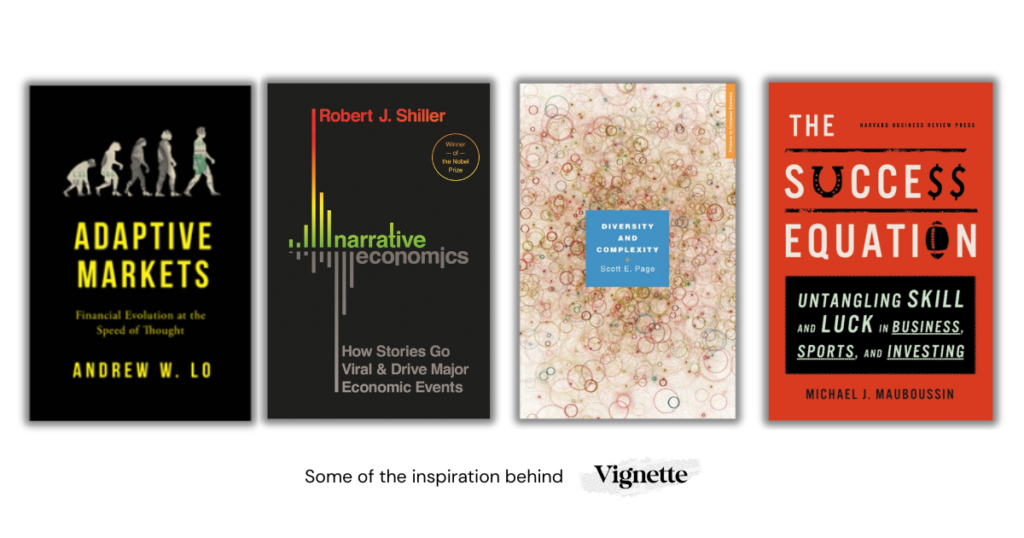Markets and industries are more complex than ever. Let’s get curious.
Hello fellow strategists and curious minds,
Welcome to the inaugural post from Vignette – a publication dedicated to exploring how businesses can thrive within the increasingly complex adaptive systems that our markets and industries have become. If you’ve found this post, then I’m thrilled you’ve joined this journey – which is essentially my way of learning, thinking and reflecting about some of my favourite* things – business, complexity science, technological disruption, and strategic thinking.
The Vignette Thesis: Diversity of ideas is critical amidst complexity
One of my great loves is hearing from great teachers, and I make no secret of telling friends that one of my favourite courses is Scott E. Page on Understanding Complexity. Within this course, Scott covers a fantastic grounding in complexity theory – including the key aspects of complex systems – connectedness, inter-dependence, diversity and adaptation.
After a whirlwind tour through biology, mathematics and economics, Scott brings us on to talking about some of the most fascinating consequences of complex systems – emergence and large ‘power-law’ outcomes. It’s a fascinating listen – highly recommended. But rather than just being a solid audiobook endorsement – this introduction into complex adaptive systems kickstarted a 10 year obsession with applying a complexity lens to industries and financial markets, and inspires the writing of Vignette today.

You see – traditional strategic frameworks often assume relatively stable environments where advantages, once established, remain defensible for extended periods. We’re talking here about some familiar frameworks like Explore vs Exploit and the concept of Moats. However, it’s part of the Vignette thesis that the world of business in 2025 is rapidly collapsing some of the traditional sources of competitive advantage, and that the new reality is one where interconnections create unexpected ripple effects, feedback loops accelerate rapid changes, and emergent behaviors constantly reshape the competitive landscape.
In this publication, we won’t just rehash established strategic thinking. Instead, we’ll explore how businesses and industries are reacting within this complex adaptive system, and hopefully discover new lenses through which to view competition, innovation, and organizational design. Together, I hope we can examine practical approaches for not just surviving but thriving amid complexity.
Rethinking Moats: The emergence of new competitive dynamics
For decades, I’ve loved hearing investors (praise be, Warren Buffet) and strategists describe good strategy as building protective “moats”—sustainable competitive advantages that keep competitors at bay. These traditional moats have included network effects, economies of scale, brand power, regulatory barriers, and proprietary technology (shout out, Pat Dorsey).
But part of our thinking at Vignette is that we’re witnessing a fundamental reshaping of the how sustainable these will continue to be, in a world where AI is democratizing capabilities at unprecedented speed. We’re already witnessing some fascinating disruptions:
- Scale advantages being challenged by AI tools that allow small teams to accomplish what once required large teams
- Network effects facing new competitive dynamics as AI reduces switching costs and creates new connection patterns
- Brand differentiation struggling to maintain relevance when AI can rapidly personalize offerings
- Proprietary knowledge becoming increasingly accessible through generative AI systems
By studying a diverse range of industries and the emergent competitive dynamics, we’re hoping to dive deep into each of these transformations, bringing you case studies of companies successfully adapting their strategies to this new reality. Naturally – we’d love to hear which of these areas interests you most—your feedback will help shape our exploration!
What Will Continue to Matter?
The whole point of Vignette is learning and discovery – but capturing a starting point will help us track this journey together. So – some of our early thought on where, despite this profound disruption, certain sources of advantage seem poised to endure, are these;
- Learning velocity matters: Companies that can learn and adapt faster than their competition will maintain edges even as specific knowledge advantages erode. Companies stuck in exploit mode will underperform those tilted to constantly exploring.
- Clarity triumphs amidst uncertainty: The ability for management to lead with clarity, in purpose and vision, will outperform those inclined to lead via distributed accountability.
- Ecosystem orchestration: As systems grow more complex, diversity of connections will outperform (think open source) – as those who can coordinate across industry and company boundaries will create unique value.
- Creative ‘taste’ is all-important: As many traditional business advantages get commoditized, deciding what not to do to be meaningful to your customers will become the main determinant of whether you win or lose.
These are hypotheses, not certainties. One of the joys of complex systems is their unpredictability, and I expect some (all?!) of these assumptions will prove wrong. That’s where you come in.
Let’s Explore Together
This publication isn’t meant to be a one-way transmission of expertise. Complex adaptive systems are, by definition, too intricate for any single observer to fully comprehend. Instead, I am hoping this can be a collaborative exploration where your insights, experiences, and challenges will enrich the collective understanding, and benefit lots of others too.
In future editions, I’ll share analysis of company strategy updates, and the frameworks that might be helpful to view them in. We’ll learn from industry leaders experimenting with new approaches, and analyze emerging patterns. But I’m equally interested in your observations. What adaptive strategies are you seeing in your industry? Which traditional advantages seem most vulnerable—or most resilient—in your experience?
Drop me a line with your thoughts, questions, or suggestions for future topics. The beauty of complex systems is that the interactions between diverse perspectives often yield the most valuable insights.
Until next time, stay curious,
Tim M
* Oh. You should know in advance that I am British, and use many ‘u’s’ in words as we are wont to do.**
** For the same reason, I also love footnotes.

